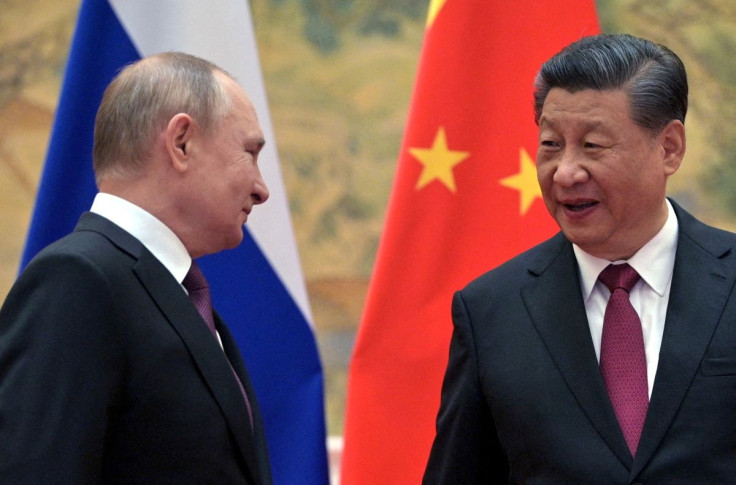Analysis-Ukraine War Could Spur Creation Of New China-led Trade Bloc

China's stance on Russia's war in Ukraine over the coming months will reshape global flows of money and trade, possibly leading to the emergence of new economic spheres, investors say.
Last month, shortly before Russian President Vladimir Putin sent his forces into Ukraine, he and Chinese President Xi Jinping declared in Beijing a "no limits" partnership, with a promise to collaborate more against the West.
Beijing has declined to join Western countries in condemning what Moscow calls a 'special military operation' while also calling for restraint on all sides.
Sino-Russian trade surged 35% in 2021 to $146.9 billion, Chinese customs data show, a trend likely to be turbo-charged by sweeping new sanctions that cut Russia from Western markets.
A shift in trade flows has been brewing since Russia's annexation of Crimea from Ukraine in 2014, said Tom James, chief executive of TradeFlow Capital Management in Singapore, a trade finance fund.
"Russia has already started trading in renminbi with China," he said, adding that banks can deal with each other outside the SWIFT network - from which Moscow is now blocked - and Beijing could benefit greatly, though not without risks.
Just over a quarter of Chinese exports to Russia were settled in yuan in the first half of 2021, up from just 2% in 2013, as both countries seek to cut reliance on the dollar.
"The X-factor is tariffs and sanctions or quotas, if they're placed, in terms of how much Russian produce countries are willing to take," James said. "It's already triggering something of a protectionism from countries for food security."
PRESSURE
Financial markets have been gyrating on worries that a Russia-China bloc could face U.S. retaliation, with Chinese equities among the worst performers since the invasion of Ukraine began on Feb. 24.
China's onshore Shanghai Composite index and Hong Kong's Hang Seng have each lost about 6% since the start of the war. That compares with a gain of about 1% for global equities and 1.6% for the S&P 500.
China's hitherto steady currency has also started to show flashes of vulnerability and volatility and on Tuesday hit a three-month low.
"The pressure is very big at the moment," one Chinese government adviser told Reuters on condition of anonymity.
"It's pragmatic to buy some oil and gas from Russia, but everybody is watching you," he said. "We don't want to upset Russia, but at the same time it's difficult not to side with the majority of countries."
And China's trade with Russia is dwarfed by what it conducts with Western countries. China's trade last month totalled $137 billion with the European Union and $123.3 billion with the United States, but just $26.4 billion with Russia.
Asked about the risks Beijing might face if it provides economic help to Moscow, including sanctions blowback, China's foreign ministry told Reuters in a statement: "China and Russia will continue to carry out normal economic and trade cooperation in a spirit of mutual respect, equality and mutual benefit."
But stress to global trade resulting from the war is already apparent in export bans and supply chain snarls.
Materials from Indonesian coal to Egyptian pulses and vegoils are unavailable for foreign sale.
Food buyers are scrambling for rice to replace Ukrainian and Russian wheat, a fertiliser shortage looms as the world is cut off from Russian potash - a key ingredient - and there seems to be little momentum to repair the globalised system.
In its place are hints at a new order where Russia's commodity and energy exports find markets in China and India while Australian minerals and gas end up in Europe.
CAUTION
Morgan Stanley strategist Jonathan Garner said in a recent podcast he was more cautious on India and China and was seeking exposure to Australia as an exporter aligned with sources of global capital and thus less prone to its withdrawal.
India, meanwhile, a buyer of Russian military hardware, is mulling an offer for cheap Russian crude and, according to banking sources, is exploring setting up a payment mechanism for rupee-rouble trade.
Decisions in China, the world's biggest exporter, have the potential to drive sizeable flows of money and goods outside a dollar-dominated system - something Beijing has sought to do for a decade.
"In essence they're creating their own operating platform which is different to the past 70 years...of the U.S.-led global capital system," said George Boubouras, head of research at K2 Asset Management which invests globally from Melbourne.
This week the Wall Street Journal reported that talks between China and Saudi Arabia about trading oil for yuan rather than dollars had accelerated, perhaps a step forward in the efforts to promote the yuan as a trade and reserve currency.
Reuters was unable to confirm the report.
However, China keeps a tight leash on the yuan and its takeup as a reserve currency remains modest.
Most market participants also doubt that China would suffer any sudden exclusion from its Western export markets, but there is a distinct flavour of epochal change in market commentary.
"When this crisis (and war) is over, the U.S. dollar should be much weaker and on the flipside, the renminbi much stronger," Credit Suisse strategist Zoltan Pozsar said in a note outlining a "regime shift" as China buys Russian commodities.
Diego Parrilla, who manages Quadriga Igneo, a $150 million fund designed to profit in turmoil, takes a very different view, and is wagering that the yuan falls as trade fragments and China prints or borrows more and more to support its economy.
"There is no return from here. Russia is heading East, not West... I think globalisation as we know it is finished, and we are in a de-facto bipolar world," he said.
© Copyright Thomson Reuters 2024. All rights reserved.




















